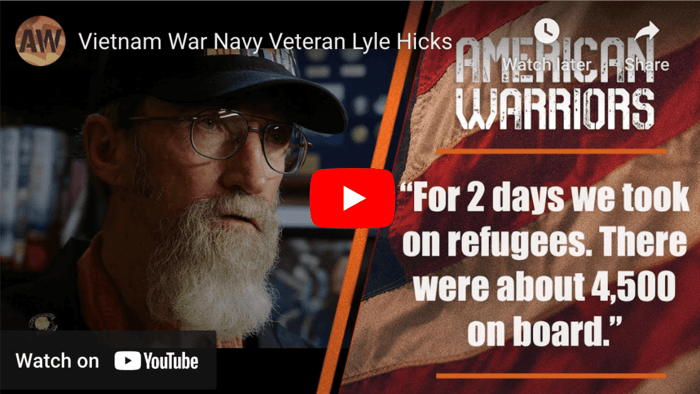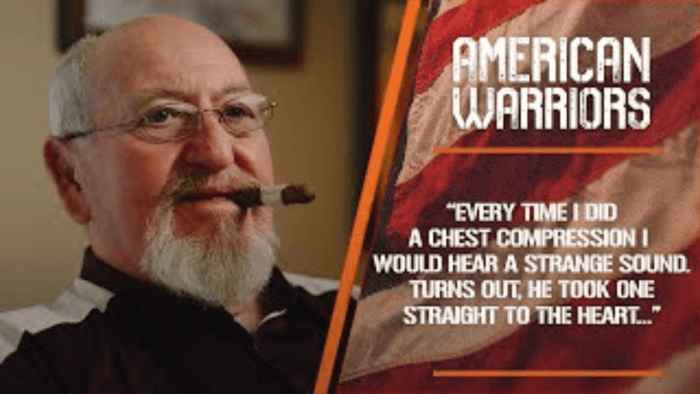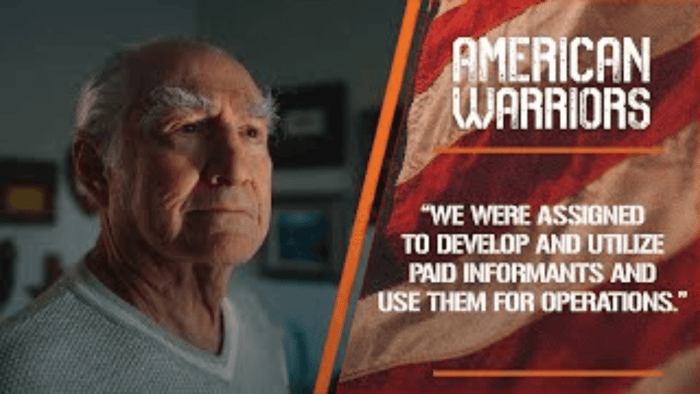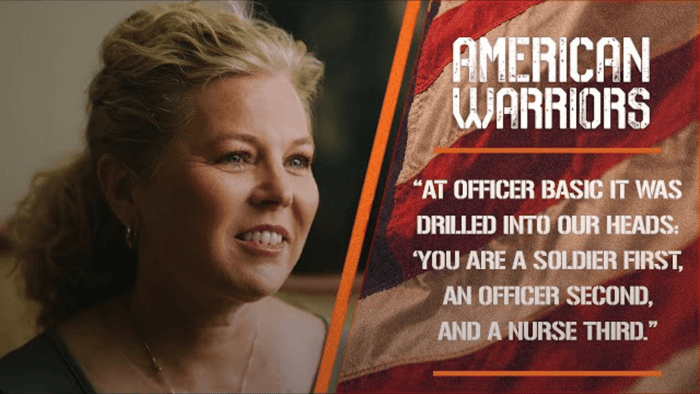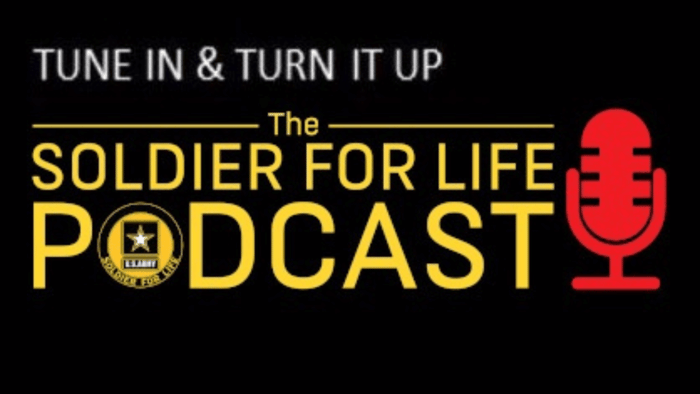Vietnam War Navy Veteran Lyle Hicks
An American Warriors production
Duration: 21mins 36s
Word count: 16120
Source: Imported file from AmericanWarriors.com
Lesson Plan
Topic: Vietnam War Navy Veteran Lyle Hicks by American Warriors
In today's lesson, we will be examining the experiences and reflections of Lyle Hicks, a Vietnam War Navy veteran who served on the USS Durham. Through a comprehensive interview, Hicks provides valuable insights into his decision to join the Navy, the technical aspects of his duties as a quartermaster, and the emotional challenges he faced while evacuating refugees during the war. Furthermore, we will explore Hicks' struggles with PTSD and the healing he found by connecting with other veterans, as well as his thoughts on the sinking of the USS Durham. By engaging in a group discussion, we will analyze the complexities of serving in the military during the Vietnam War and the lasting impact of war on veterans.
The following is a comprehensive interview with Lyle Hicks, a Vietnam War Navy veteran who served on the USS Durham. Hicks shares his experiences and reflections on his time in the Navy, including his decision to join, his duties as a quartermaster, and his involvement in evacuating refugees during the war.
Introduction
Hicks' journey to the Navy began when he was a young man from a small town in Oregon. He joined the Navy with the intention of seeing more of the world and learning new skills. He found his calling as a quartermaster, a position that allowed him to use his math skills to navigate the ship and ensure its safe passage. Throughout the interview, Hicks provides detailed descriptions of the technical aspects of navigation, including the use of a sextant and how to compute the ship's position using the stars.
Hicks also shares his experiences evacuating refugees in Vietnam, which was one of the most difficult and emotional times for him during his time in the Navy. He remembers the panic and fear he saw in the refugees' eyes and the challenges of trying to feed and organize so many people. He also reflects on the tragic fate of many of the refugees he helped evacuate and how this impacted him deeply.
The interview also delves into Hicks' struggles with PTSD and how he found healing through connecting with other veterans. Hicks initially struggled with PTSD in silence, feeling like he couldn't talk about his experiences with others. However, he eventually sought help and found support through the "band of brothers," a group of veterans who he connected with and who helped him heal.
Aside from the emotional aspects of his experiences, the interview also includes Hicks' thoughts on the sinking of his former ship, the Durham. Hicks shares his sadness and disappointment that the ship was sunk and used as a target, and how this impacted him as someone who had spent so much time on the ship.
Overall, this Notion document provides a powerful and personal account of one veteran's experiences in the Navy during the Vietnam War. Hicks' willingness to share his story and reflections on his time in the Navy provide valuable insights into the challenges and complexities of serving in the military during this time. It also sheds light on the lasting impact of war and how veterans continue to struggle with its effects long after their service has ended. (Vietnam War Navy Veteran Lyle Hicks by American Warriors)
Feature Video
Group Discussion Questions
Lyle Hicks' decision to join the Navy:
- What factors influenced his decision to join the Navy?
- How do personal motivations for joining the military vary among individual
Duties and skills of a quartermaster:
- Discuss the importance of a quartermaster's role on a ship.
- How have navigation techniques evolved since the Vietnam War era?
Evacuating refugees in Vietnam:
- What challenges did Hicks and his crew face during the evacuation process?
- How might these experiences have impacted the crew both during and after the war?
PTSD and healing through connecting with other veterans:
- Why do you think it was difficult for Hicks to discuss his experiences initially?
- What role do support groups and shared experiences play in helping veterans cope with PTSD?
Reflections on the sinking of the USS Durham:
- How did the sinking of the Durham impact Hicks emotionally?
- How can the loss of a ship or other military asset affect those who served on it?
The lasting impact of war:
- How do the experiences of veterans like Hicks illustrate the long-term effects of war on individuals?
- What can we learn from these personal accounts in order to better support veterans in the future?
Transcript brought to you by AmericanWarriors.com.
(00:25)
I was born in Bend, raised in a little lumber town called Gilchrist, just about 50 miles south of Bend. I was a very small child. In fact, the kids at school nicknamed me Pixie because of it. When I got out of school, I didn't know what I was going to do. (Vietnam War Navy Veteran Lyle Hicks by American Warriors)
(00:42)
But I knew that I didn't want to stay there in Gilchrist. If I stayed there in Gilchrist, I was going to work in the sawmill the rest of my life. And so I decided to follow my dad and my brother and join the Navy.
(00:53)
Well, the reason I joined the Navy over those other services was the fact that they were going to go see more places. First off, I didn't want to be in the jungle. And then I thought about the Air Force, but you're.
(01:04)
Going to be put. On a base, and you're going to stay in that base. So maybe I'll go to Germany, or maybe I'll go somewhere else, and it'd be interesting. But I wanted to see more of the world. And so I knew that the Navy went to different ports, and indeed they did.
(01:17)
I saw. I went all over the phil. Philippines, Hong Kong, Japan, Korea, Taiwan. Vietnam. This is the United States Navy. The aircraft carrier, the cruiser and destroyer, the modern deep water navy extending American strength across the oceans of the world.
(01:38)
But in Vietnam, the American Navy has done an unprecedented variety of different jobs. I really didn't have any idea what I was getting into. When I got into the Navy, I found out that I had a choice.
(01:51)
Of five things, from yeoman to machinists mate. Many of the men below decks work at the important traditional jobs familiar and naval ships throughout the world. I wanted to be more clerical in nature, I believe.
(02:06)
And so they said, Well, Quartermaster is the captain's clerk. And I thought, okay. So I put it down. What I didn't know was the quartermaster was in navigation, and it was perfect for me because I have a bit of a math head and there's a lot of math involved in navigating.
(02:25)
And so it was actually the best position for me to be well, for me, a day at sea was that you get up before the sun goes up, and you go up and you shoot fixes on stars so that you have a position. A relationship exists between a body on the celestial sphere and the point on the Earth directly beneath it.
(02:53)
This point is called the geographical position, or GP, of the particular celestial body. It is the point which, at a given instant, has that body at its zenith. I went to a school for it, for navigation.
(03:10)
So it was like a two or three month class where they taught us how to. How to use a sextant and then. How to compute from there to find your lines that you get. So you'd have different stars and they put a different align.
Vietnam War Navy Veteran Lyle Hicks by American Warriors
(03:27)
Where those lines intersected is where you are. But when you're in the ocean, it's it's celestial back then, and that's all you had. You would take your sextant and and you would, like, rocket back and forth, and then wherever it was, the closest was where it was when you would have it straight up.
(03:47)
If I remember right, it was like 45 minutes or 15 minutes after sunrise and 45 minutes before sunset, where you find the best stars and you can get to be able to see the horizon. Also, everybody's position on ship was important, but mine was, where are we and.
(04:06)
Where are we going? The last time we went out, our last tour, we went out with about three or four ships, and I was the head of my group of the navigation department, and I had us south of where these other ships had us.
(04:27)
And so our captain, our ship, allowed them to break off. I brought us in right underneath Hawaii, right into place. We were there a day before anybody else. And so when they called liberty, the crew and Mike was pretty happy with me because I got a day more liberty than those other ships got.
(04:49)
So it was fun. We were in Korea. We were doing I was actually teaching South Vietnamese officers how to navigate in Korea, and we were called to go back to the Philippines. We went back to the Philippines.
(05:08)
We dropped off the South Vietnamese guys, and they went back to Vietnam and. And we took on Marines and their gear and headed to Vietnam to evacuate refugees. We had no idea what we were going to find.
(05:26)
We came in and anchored not knowing still what we were going to see or how it was going to go. And pretty soon a boat shows up and we took on our first refugees. The, the word seemed to get out and before we knew it we were inundated with boats.
(05:48)
And for two days we took on, we took on refugees. We ended up with about 4500 onboard. The NVA was coming in from the north, the Vietcom was coming in from the west and pretty much had them trapped there.
(06:16)
And so we were trying to get as many of them out as we could before they got there. It was very difficult to see. You saw a lot of panic and fear in their eyes was hard. We would go down and to feed them and they would rush you because they hadn't eaten obviously.
(06:35)
And to try to get that organized to try to give them food and drink. Two days in the NBA took over the base of Cameron Bay and they fired a shell over the brow of one of our ships and told us get out of the water.
(06:54)
And we were told directly from Washington to leave. And so we left. And as we left in fact, the NBA tanks were on the cliff pointed at us and we left the guys bopping up and down in the water waving at us thinking we were going to come back and.
(07:13)
And we weren't. I found out later that most of those people were slaughtered, and that was what affected me the most. It was heartwrenching. I was very angry. I went to the Navigator and told him I was going to tell the story.
(07:35)
I was going to write a letter to the Bulletin, say what was really happening. And he said, no, you're not. In fact, the information you have is top secret, and you're not going to divulge it to your fellow shipmates either.
(07:48)
And so I held it within and I pushed it down. The war wasn't a popular war, and we weren't popular because of that. So when I got out of the Navy, I pretty much ditched everything I had and took off to be a civilian.
(08:08)
And so I never talked much about who I was or what I was. I think I knew more that my grandpa was in the Navy than I knew even my dad. I remember in elementary school for Halloween one year, I dressed up as a sailor, but if I remember correctly, it was my grandfather's uniform that I was dressing up as.
(08:33)
I don't even know that I necessarily knew my dad served in the Navy at that point. I ended up in Bend with nothing. I had family of four. There was no jobs. I put on a suit and the street looking for work.
(08:55)
So I went for three months solid looking for work. I had a house that I talked the owner into renting to me for $100 a month, and I would take care of the house. Well, it was. Old it was the old egg farm for Bend.
(09:13)
It was airy. The wind went right through it. So I put curtains up, and I tried to keep the heat in where the bedrooms were. I mean, it was the lowest of the lows. I put an ad in the paper, put me to work, and I worked all sorts of odd jobs.
(09:29)
I did whatever I could to get by. And then on the same day, I was offered job at Jake's, and I was offered a job frito lay. Well, the Jake's job. I said, I want to go to college. I have the GI bill, if you will.
(09:45)
I'll do whatever you got. I'll scrub your toilets or do whatever you get what you want as long as you let me go to college. Well, they they put me on a swing shift. So I go to college in the morning and then pump fuel in the afternoon.
(09:57)
Start pumping fuel in 71. Well, a couple of months into it, they found out that I was going to college for accounting. I needed somebody in the office. So they put me up in the office in January of 72.
(10:12)
They said, okay, we're going to give you the title restaurant manager. You're not going to manage a restaurant. You're just going to keep on doing what you're doing. You're going to buy. I learned the restaurant in from the back door to the front, and by the end of 72, I was managing the restaurant.
(10:27)
Also in the would go on vacation. And it was pretty much the crew kind of they thought it was kind of funny, because the week before I go on vacation, I get sick and I go to the doctor, and I ended up with finding these pills that helped me out during the vacation.
(10:47)
But we had no idea what PTSD was. The earliest time, I can remember seeing my dad struggle. We were on a trip down in California, and I didn't know at the time what was going on other than something was happening, but I didn't know if it was an illness or something more.
(11:08)
I remember feeling scared. A lot due to the fact that I didn't know what was going on. I remember them needing to take him to the doctor, and I wanted to stay with him, and they wouldn't let me. And I had to go to the San Diego Zoo without him.
(11:27)
And that was a little bit of a struggle. On 911, my best friend gave me a call because we were supposed to fly out that morning to Las Vegas together. And he called me and said, Turn on the TV. And I turned on the TV, and I sat on the bed with my wife, and I watched the people running from the buildings.
(11:47)
And I turned to Judy, and I said, I've seen this before. And she said, Where? I said, Vietnam. That really hit me hard. I couldn't work well. I ended up running a restaurant. You should be down in the restaurant.
(12:02)
I would be hiding in my office. I'd go home on the weekends, and I closed myself up in my room and didn't want anybody to bother me. My pastor saw the problems, and he introduced me to a guy named Doc Carnahan.
(12:21)
The doc took me into his office and started talking with me, and he said, do you think you have PTSD? And I said, how could I, Doc? My boots never hit the ground. I thought it was like jungle rod or something like that.
(12:34)
And he got me into the VA system, and my healing began right there and then. The band of brothers showed up. Now, I still was a closeted vet. I still was down in the bushes. They came in, and they wanted to use my back room, which was fine with me, but I wasn't interested in going to their meeting.
(12:59)
So a guy named Zen Watford, who was their leader at the time, he grabbed me and said, come on. Come on back here. Come and join us. So I went back and. Satellite, and they were kind of fun. They brought that back out of me, the pride of being a veteran back.
(13:15)
Out of me, and I began to. Heal and be proud of who I was and what I had done. And salute. I pledge to the flag of the United States of America and to the republic for which it stands, one nation indivisible, with liberty and justice for all.
(13:49)
Covers off our father. Lord be thy name. Thy kingdom come, thy will be done, on earth as it is in heaven. Given us this day our daily bread and forgiveness our trespasses as we forgive those who trespass against us.
(14:15)
For people, for thine is the kingdom, the power, and glory forever. Amen. God bless America. That's the 50 year pin. Official 50 year pin that the government gives out for Vietnam. Well, I found that what I need to do is look for those guys.
(14:45)
That were like me, that was down in the bushes. And so I look in the corner of the restaurant is generally, that's where they're at. And if I see somebody, I'll go over and I'll interact with them. And so I went over and I saw this guy, and I started talking to him, and I said, See this pin?
(15:00)
You get one that pins. And he said no. And I took the pin off and I handed it to him, and he began to cry and. And I knew that I had to be involved in it. And so when I walk around the room and find these guys now and say, hey, did you get your 50 year pen?
(15:15)
And if they say no, hey, right, where were you at? Stay where you at. Don't you move. And I'll run out of the office and bring it back out to them and give it to them. For them, it's a welcome back. Hopefully, it's an encouragement to get help if they need help.
(15:29)
To me, it's healing. Um, and with the vet center now here in Bend, if I see a guy needs that, I'll direct him to the vet center and get him down there to get help so he can start healing like I healed or like I'm healing.
(15:53)
The Durham was the LKA, which I believe stands for landing cargo and attack. There was a cargo ship. We had four holes, six deep, where we could carry all the marines gear, their jeeps, their tanks, whatever.
(16:09)
And then we had room, I believe, for a couple thousand, I think, marines we could carry on board. I took Judy out with me that's point loma in the background there, that's off the coast of San Diego.
(16:25)
Now, this was my division right here. That's me right there with a guy named Maxwell. And this is the picture that we have of the baby being passed over. Whitney was one of the guys that was taking that child that day.
(16:43)
Those are the cranes that would carry the boats or lift the boats off, drop them down, and then also the cargo that would go into the boats. We'd have eight, what they call mic boats. And those are boats that the front come down like you see in the old movies, where they go up on the beach and the front drops.
(17:03)
We could load the gear, and we could load them in those. And then land them. That was the primary job of the durham. It was put into mothballs in 94. After it was decommissioned, we knew that they were going to do something with it.
(17:20)
They were going to dispose of it in a certain way, and we thought maybe it could be used reused. All the metal can be used for a variety of things, and we thought that was kind of cool. Or it could be just sunk for a reef, and that would be all right, too, because you still be able to see it.
(17:37)
But last year, I was reached out to by a fellow in hawaii, and he sent me some pictures, and he said, they're hauling out your ship. They're going to sink it and rim pack. And then that was when we found out that it was going to be sunk in the deep water and used as a target.
(17:58)
I was sad because nobody's ever going to see it again. In fact, I remember earlier in the year, I had a friend that was in hawaii that was trying to get as close as he could to it to take pictures. For me, there's a couple of things that bugged me about it.
(18:16)
One, that it was at the bottom it was being sunk at the bottom of the ocean. The other was how they did it. They did it by shooting rockets at it and shooting torpedoes at it. And we saw what could have happened, maybe even when we were born.
(18:32)
And it was really shocking and sad to see and experience, knowing that the bridge that the rocket hit was where I would be standing if I was there. That was kind of a weird feeling. This is a piece that one of the guys on board the ship wrote, and it was his feelings regarding the ship and what had happened.
(18:59)
It goes, we're all born and we die. It is a natural way of the universe. We were born during a bleak war. You helped evacuate Saigon refugees that may have been killed by the communists that took over.
(19:14)
You were on station when hostilities began in 91. But the world changes, and we change with it. You were unceremoniously decommissioned in 94 and sat in a beautiful lagoon in Pearl Harbor. Meanwhile, the world continued to change age.
(19:31)
Your crewmen raised families, and they grew older. Once again, you're called upon to serve. The country who flagged you proudly flew. But endings are sometimes new beginnings. You're in a new state of being.
(19:44)
The darkness of the ocean bottom is now your shield. The bottom dwelling creatures will soon be your new crew. No more sacrifices will be asked of you. You are at peace. My time, born of the Durham, is when I grew up and I began to understand what the world was like.
(20:04)
I began to understand what I was like. I guess I got a foundation of what I wanted to be and who I wanted to be. I feel extremely blessed sometimes. I didn't understand what was going, what was happening at the time, and such as the 911 situation.
(20:26)
But everything seemed to have fell into place from one thing to the next. This is a couple of verses that. Were given to me back in the 90s by a friend who saw me. Struggling when I was on vacation, and it became my life.
(20:42)
Verse Philippians four, six and seven. Be anxious for nothing, but in everything by prayer and supplication with thanksgiving. Let your request be made known to God. And the peace of God, which surpasses all comprehension, shall guard your hearts and your minds in Christ Jesus.
Closing
The Parade Deck is dedicated to empowering and promoting our talented creators, offering a platform that nurtures growth and visibility. By transforming our creators' YouTube videos into SEO-optimized articles, we enhance their discoverability and reach. Our innovative approach, using AI to convert videos into scripts, allows us to share valuable insights and content with a broader audience, ultimately supporting the success of our creators.
Discover more exceptional content and join the Parade Deck community, where we're committed to amplifying the voices of our creators and driving their success in the digital realm.
